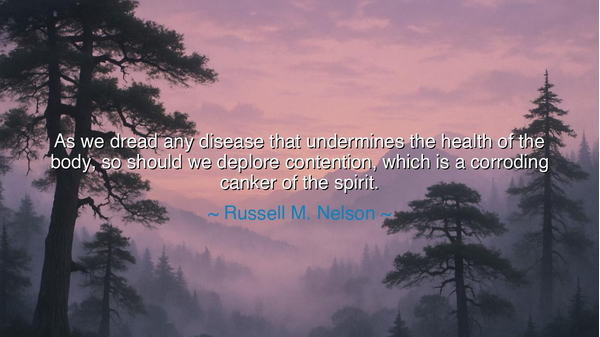
As we dread any disease that undermines the health of the body
As we dread any disease that undermines the health of the body, so should we deplore contention, which is a corroding canker of the spirit.






The Illness of the Spirit
Hear the solemn and timeless words of Russell M. Nelson, healer of bodies and shepherd of souls: “As we dread any disease that undermines the health of the body, so should we deplore contention, which is a corroding canker of the spirit.” These words flow not only from the mind of a man of medicine but from the heart of a man of faith. For he who has studied the ailments of the flesh knows well that the body can recover from many wounds—but the spirit, once poisoned by anger and division, withers slowly and in silence. In this truth lies a warning for all generations: that the soul, like the body, must be guarded with care, for both are temples of divine design.
The Meaning of the Teaching
Nelson speaks of contention—the bitter strife, the ceaseless quarrels, the proud refusal to yield—as a disease of the spirit, as destructive to the inner self as sickness is to the flesh. Just as infection begins unseen, spreading quietly until it weakens the whole body, so does contention enter through pride, resentment, or envy, and consume the peace of the soul. A body wracked with fever may be treated with medicine; but a heart consumed by hatred can only be healed through humility, forgiveness, and love. Thus, Nelson calls upon us to treat conflict not as a mere disagreement, but as a spiritual affliction—one that must be recognized, repented of, and cured before it destroys the inner harmony of life.
The Origin of the Words
These words come from Russell M. Nelson, a man whose life has united the art of healing and the pursuit of holiness. Before becoming a spiritual leader, he served as a renowned heart surgeon, mending what was broken within the bodies of men and women. Yet through decades of service, he came to see that the wounds of the soul were often more painful and enduring than those of the flesh. His teaching, therefore, springs from the dual wisdom of both science and spirit: that peace, like health, requires constant vigilance and nourishment. He speaks as one who has seen both the frailty of the body and the tragedy of bitterness—and who knows that both, if neglected, lead to death.
The Parable of the Kingdom Divided
Consider the story of a mighty kingdom that once flourished under unity. Its people were strong, its harvest abundant, and its walls unbreakable. But pride crept among its leaders, and envy stirred among its people. Words became weapons, and hearts, once united, turned cold. Brother fought against brother, neighbor against neighbor. The kingdom, though rich in strength and skill, began to decay from within. When enemies finally came, they found no need to conquer—the kingdom had already destroyed itself through contention. This tale, though ancient, reflects the truth of Nelson’s warning: that discord is the slow poison of every nation, every family, every heart.
The Nature of Contention
Contention is not merely anger—it is ego unrestrained, the refusal to see others as one’s own kin. It divides families, darkens communities, and corrupts nations. It thrives on pride and ignorance, feeding on the illusion of superiority. Just as cancer spreads through the cells of the body, contention spreads through words, thoughts, and deeds—turning love to suspicion and fellowship to hostility. The wise therefore guard their speech and temper their hearts. For to speak in wrath is to breathe venom into the air, and to listen in resentment is to drink it back again.
The Healing of the Spirit
To cure this canker of the soul, one must become both physician and patient. The remedy is found not in dominance but in meekness; not in vengeance but in forgiveness. Just as the body heals through rest and nourishment, so the spirit recovers through prayer, reflection, and charity. When we choose peace over pride, we purify the heart and strengthen the bonds that unite us to others. The ancients knew this: that harmony within the self brings harmony with the world. Thus, Nelson’s wisdom calls us to cleanse our inner lives, that we may stand whole—free from the fever of contention and the rot of resentment.
The Lesson for the Generations
Therefore, O listener, learn this enduring truth: guard your spirit as you would your health. Be quick to forgive and slow to anger; seek to understand before you seek to triumph. When quarrels arise, step back as the physician does before the wound—examining, not striking. Let your words be gentle, your heart patient, your soul anchored in peace. For the one who masters their temper heals themselves and all who dwell in their presence. And where peace is cultivated, life—true, abundant life—takes root.
The Eternal Counsel
So let the words of Russell M. Nelson echo through the ages: “As we dread any disease that undermines the health of the body, so should we deplore contention, which is a corroding canker of the spirit.” These are not mere metaphors—they are laws of the soul. Just as the wise cleanse their bodies of poison, so must the noble cleanse their hearts of bitterness. For a healthy spirit is the fountain of joy, the wellspring of courage, and the mirror of divine peace. Let every generation remember: he who conquers contention conquers himself, and he who lives in peace becomes a healer of the world.






AAdministratorAdministrator
Welcome, honored guests. Please leave a comment, we will respond soon